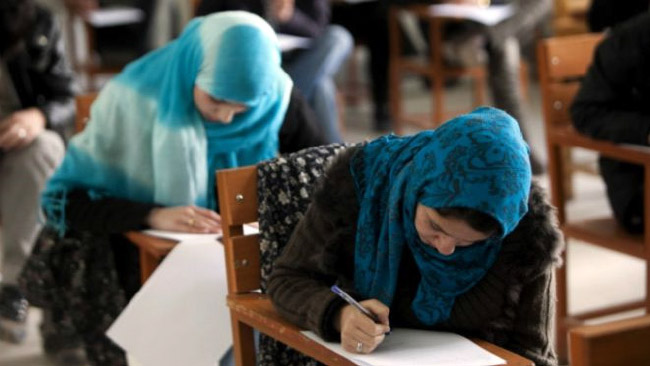University entry exam (Kankor) and its administration have evolved into symbolizing higher education in Afghanistan and the challenges involved with a major part of it. The Ministry of Higher Education announced on Sunday April 03, 2016 Kankor examination results. According to the officials, over 58 thousand students have qualified for entry to state universities; more than 46 thousand people have passed the exams to enroll to semi-government higher education and 40,000 others will be introduced to private higher educational institutes. Each year, administration and management of the university entrance examination are involved with a number of challenges. In many areas across the country, the examination is marred by fraud and forgery or the students go to the exams amidst severe cold weather and security threats.
However, the Ministry of Higher Education had introduced many new measures this year to conduct the nation-wide examination and reduce the challenges involved with it. Some of the measures are believed to be effective in dealing with the challenges related to the on-scene conduct of the examination, scoring and announcement of the examination. However, as it is obvious the ministry of higher education should be able to rapidly improve administration of Kankor and resolve the relevant technical issues that create many problems and mar transparency of Kankor exam. The exam used to become a major controversy at some points as the ministry was unable to efficiently conduct the examination across the country and maintain order and transparency. However, there have been progresses in terms of technical issues and the overall administration of the examination.
But the real challenge for the Afghan government is to deal with greater challenges involved with Afghanistan’s higher education and development of the country’s human resources. Each year a large number of people seeking to get into state universities get failed and those who pass the exam have a long way to get higher education and find jobs after graduation. The post-Kankor is becoming a new experience whether good or worse for many of the aspiring students. The post-Kankor era matters for either those who have succeeded or the ones who have failed. The post-Kankor problems are important and deserve reflection.
Students who manage to succeed and get to the universities will face many difficulties. The system of Afghanistan's higher education is largely outdated and perhaps unhelpful to prepare the students for a career to enter the market when they graduate. The content of the university education is old and ineffective and the instructors do not have the ability to research and empower the students with crucial skills. Afghanistan’s universities have not been able to renovate and follow the paths of other world higher education institutions. As result, what are taught at the universities in Afghanistan will not be helpful in meeting the needs of the society and the students will not be able to easily get to the labor market after graduation.
Most of instructors serving at state universities are elderly professors whose barely have master’s degree. These long-serving instructors have long been resisting any changes that see employment of new young professors as they clearly will lose out to newcomers who have better educational credentials. Many of the university students get along with unbearable behaviors of their instructors and graduate with memories of harsh treatments of the lecturers. These are only few of the challenges that the students at the state universities experience.
The national unity government has taken relatively bold measures to bring reforms to the country’s higher education system. The plan, however, has met fierce opposition of the existing cadres. The government needs to remain steadfast in tackling the low quality higher education and in particular bring reforms to the government universities.
The challenges with the state universities and Afghanistan’s higher education is much more and complicated. Thousands of the applicants have failed to get to university. Leaving aside how much they suffer psychologically, it is an urgent matter that those who have failed to enter to universities should be absorbed in the labor market. The situation for employment is even somber. In addition to those who are not successful in entering universities, thousands of university graduates graduating each year fail to get employment despite having higher education and academic degrees. On one hand, there are growing numbers of people who seek job and employment while, on the other hand, Afghanistan’s labor market do not have the capacity to provide jobs to those seeking employment. Worse than all, even many of those who are employed lose their jobs due to the fall of the international aid and the decline of the economy.
Government should start making reforms in both secondary and higher education institutions. While more investments are needed for the education sector, the educational agencies of the government can embark on reform plans by current means that they have. The focus of the reform efforts must be on renovating the largely monologue lecture system currently applied in schools and higher educational institutes and upgrading it to more diverse and engaging methods.
Home » Opinion » Kankor and the Challenges of Afghanistan’s Higher Education
Kankor and the Challenges of Afghanistan’s Higher Education
| Abdul Ahad Bahrami

